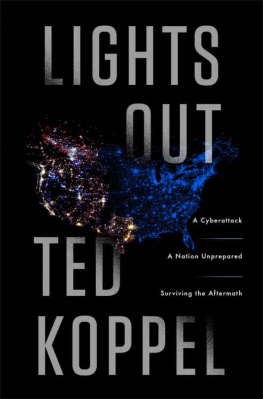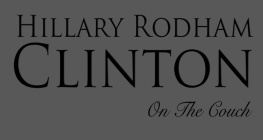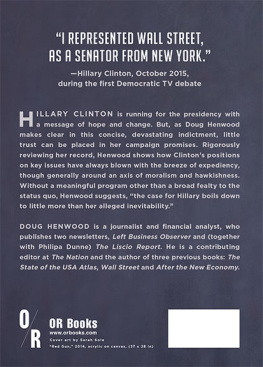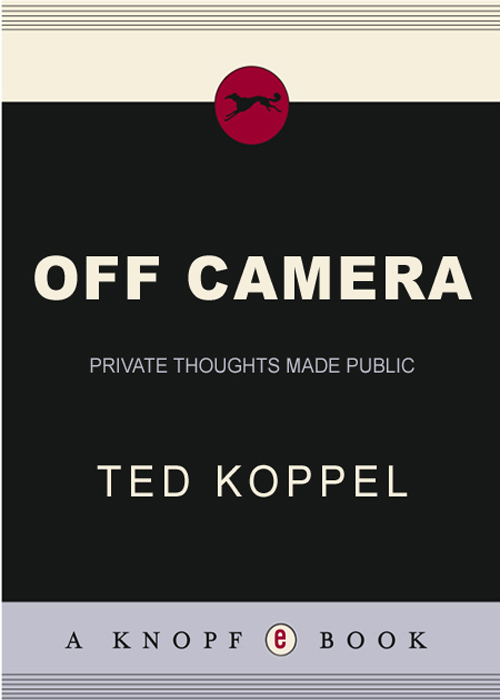
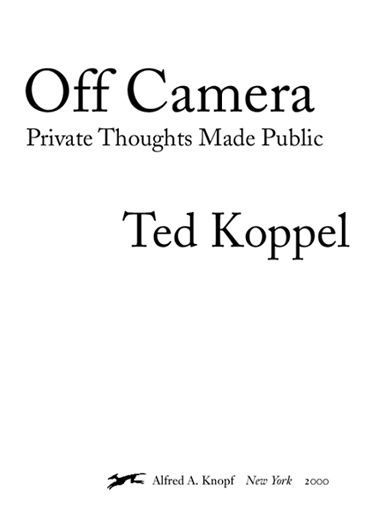
Contents
For Grace Anne,
who for forty years has made all the good things in my life possible.
Introduction
Many people are mildly surprised when they meet me in or around Washington, D.C. The exchanges in which I am involved tend to follow this sort of pattern:
VIEWER: What brings you to Washington?
TK: This is where we do Nightline. Ive been doing Nightline out of Washington for more than twenty years now.
VIEWER (incredulous): I thought you did the show out of New York.
Depending on how much time I have, I sometimes use such occasions to underscore the fallibility of television as a medium of communication. I am, after all, introduced on each program by Nightline announcer Bill Rice, who intones:... and now, reporting from Washington, Ted Koppel. I end each program by saying,... for all of us here at ABC News in Washington, good night. For many years there was also a sign behind me identifying the location as ABC NEWS WASHINGTON. Roughly speaking, then, over the course of five thousand programs, the information has been conveyed some fifteen thousand timeswithout much effect, it seems.
My unsought barrage of information slows people down a little, but usually leads to a less debatable observation:
VIEWER: Youre shorter than you look on TV.
TK: So are you.
VIEWER (slightly embarrassed, perhaps trying to make amends): Youre better-looking in person, though.
I mumble something about the cruelties of studio lighting, and we continue along our separate ways.
Television, it is true, is an illusory medium. It conveys the impression of intimacy without the substance. In early March 2000, millions of Americans journeyed (as the result of Katie Courics altogether admirable campaign against colon cancer) via television and a fiber-optic camera into the innermost recesses of the Today show stars privacy. Viewers saw more of Katie than they had ever seen of their significant others. How could they not believe themselves intimately connected to this complete stranger?
I have been appearing on television for nearly forty years. People older than I have watched me mature and age. Younger people, now themselves in their thirties, forties and fifties, remember me from their childhood. I have attended them in their kitchens and dens and, as several hundred women (reveling in the naughtiness and originality of the observation) have told me, they go to bed with me every night. How could they not presume to know me?
They presume to know my politics, my views on such matters as abortion and gun control. They draw their inferences from a raised eyebrow or a tone of voice. If my questions are nonconfrontational, they presume my sympathy for the person being interviewed. They appear to have a hard time believing that I would ask a tough question of someone I like. It occurs to surprisingly few people that I am principally concerned with extracting information from a guest, and that my tone or apparent mood or facial expression has little or nothing to do with what I really think.
This book may resolve some of that confusion, but not, I trust, all of it. Each of us has several layers of opinion, passion and intimacy. The stylized role of a television news anchor is designed to reveal as few of these as humanly possible. A journal is a much more subjective medium.
The title of this book is intended to suggest that it contains opinions I would never express on the air. Often these opinions deal with stories I covered for ABC News. Sometimes the entries are unrelated to my work altogether. In all instances, observations were recorded daily. A few have been deleted, but only because my new friend and editor, Jonathan Segal, found them too labored or trivial to merit inclusion. That standard might well have been applied to several more. But part of a journals value rests in an authors willingness to leave contemporaneous observations as they were at the time they were made. Some judgments, reached at the end of a long day, betray the weariness of the writer. Others would clearly have been modified had information, available now, been known to me then. In essence, though, whatever its flaws or virtues, this book is a journal of subjective snapshots of the twentieth centurys final year, and some memories and observations it triggered.

January
January 1 / Captiva, Florida
Hope and foreboding. Not necessarily in equal measure, either. What every new year has that recommends it over the old one is the promise of uncertainty. We know what happened last year. There is always the possibility that we will learn from our mistakes, tighten our abdominals, stop smoking, exercise greater patience and dedicate our lives to the selfless pursuit of Mans greater good. There is also the off chance that pigs will fly.
What makes the prospect of 1999 particularly gloomy is that the year begins perched on the detritus of 1998. What punishment, short of removal from office, will the U.S. Senate cobble together for William Jefferson Clinton? Surely someone will find an eighteenth-century solution in the delphic mutterings of the Federalist Papers. Actually, the twentieth century has already formulated its own equivalent to the pillory and stocks: Letterman, Leno, Imus and the various front pages of a hundred newspapers and magazines, together with the daily flaying on radio talk shows and television news programs, have already delivered their populist punishment, without having undermined the will of the people or, at least, the will of those millions of civic souls who dragged themselves to the polls to vote for Clinton in 1996.
Whichever way it goes, it will leave a nasty aftertaste. The president and First Lady will speak piously of national reconciliation, while their loyalists ram the rockets red glare up the tailpipes of the right-wing fanatics, who have confused low morals with high crimes. The right-wing fanatics, meanwhile, will speak piously of having made television newscasts safe for viewing by their children again (as though anyone without dentures even watches the news anymore), and then they will encourage Lucianne Goldberg to collaborate with Howard Stern in the drafting of A Moral Compass for the New Millennium.
It can safely be predicted, meanwhile, that we are all destined to become wholeheartedly sick and tired of the new millenium before it even gets under way. The term wretched excess was coined for the American experience during a year such as this. Has the product been designed that will not presume some benefit of association with the new millenium? Is there a family so removed from the sense of the moment that it has not yet felt the first uneasy stirrings of being insufficiently prepared for next New Years Eve, even as it shakes off the aftermath of last night? It may yet prove to be a perfectly glorious year, in which decency, civility and good taste prevail.
Or pork chops may sprout wings.
January 2 / Captiva
One more note on the millenium: The New York Times editorial board must be acutely conscious of its responsibilities to point us all in the right direction. Sometimes, though, mere opining or editorializing is not enough; a declaration is required. Yesterday the Times declared that it was all right to take the new millenium seriously. It wasnt altogether clear whether that makes it simply permissible, or if its now obligatory. The newspapers finest minds will probably express themselves on the subject again.
Next page

